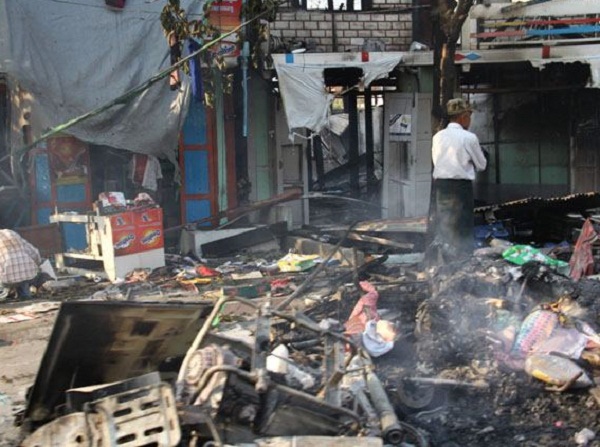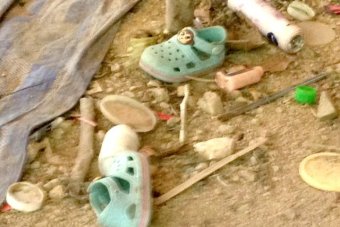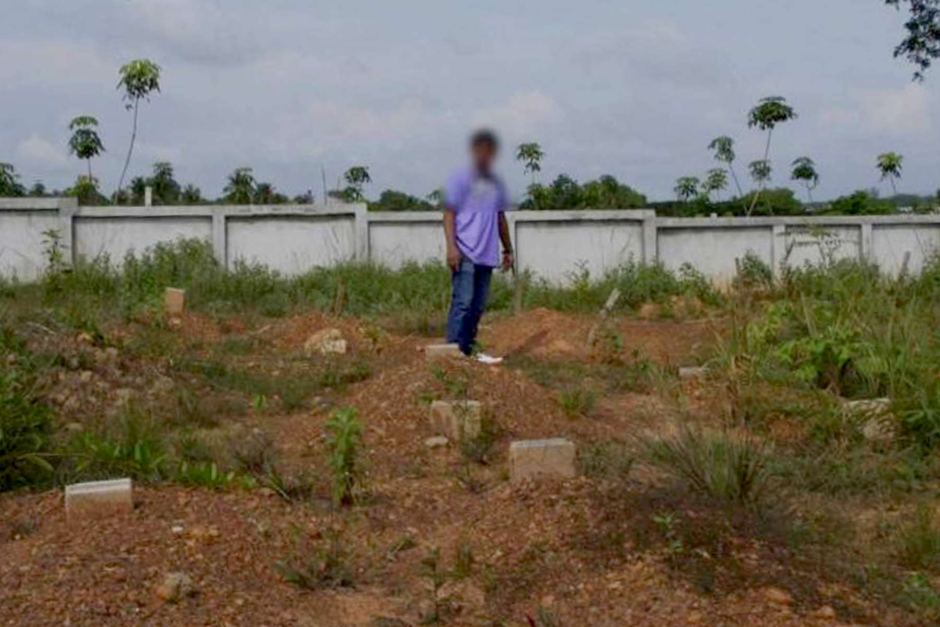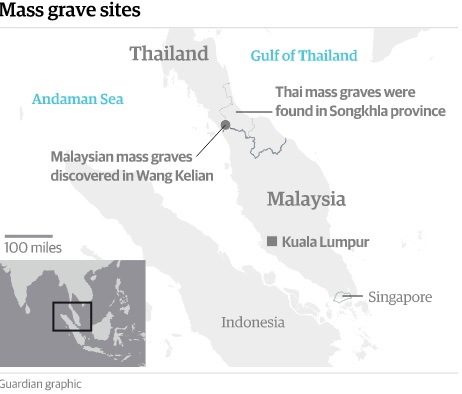Multiple news sources have been reporting updates on the human rights crisis and ethnic cleansing of Rohingya Muslims, including mass graves in multiple countries, as a result of refugees fleeing from oppression in Myanmar to Malaysia, Thailand, and other countries. This includes a new report of the discovery of new mass graves on Monday, June 23, 2015, near the Thailand immigration offices and half a mile from a Thailand police office. Both Thailand government officials and Malaysia police officers have been arrested as co-conspirators.
Australia broadcasting media reported that this human rights atrocity begins with the responsibility of Myanmar government actions to force the Rohingya out of the country by destroying their homes and businesses, burning them down and bulldozing them. “About 140,000 Rohingya were forced away from the city, into an area of dried up mud flats near the sea now known as the Sittwe internally displaced people camp. They live on rations provided by the United Nations and the area has been fenced so they cannot leave.” Australia reporter Mark Davis stated “A Buddhist extremist mob turned on them very violently, their houses were burnt down, their businesses were burnt down, their wealth was taken away from them and they were pushed out of Sittwe and fled to the coast.”
As we have previously posted, the news media has reported on Myanmar Buddhist extremists’ burning alive of Rohingya Muslims within Myanmar, including a March 2013 atrocity at Meikhtila, where 36 Rohingya Muslims, mostly teenagers, who were slaughtered before the eyes of police and local officials who did almost nothing to stop it. The Associated Press reported on such atrocities of burning people alive, including burning 36 children: “Their bones are scattered in blackened patches of earth across a hillside overlooking the wrecked Islamic boarding school they once called home. Smashed fragments of skulls rest atop the dirt. A shattered jaw cradles half a set of teeth. And among the remains lie the sharpened bamboo staves attackers used to beat dozens of people to the ground before drowning their still-twitching bodies in gasoline and burning them alive.” According to Radio Free Asia, seven were arrested for this atrocity. This is the level of persecution and atrocities against human rights in Myanmar which drove these refugees to flee their country.

A man stands among the rubble of a burned building in Meikhtila. Myanmar, where 36 Muslims were burned to death in March 2013 (Source: RFA)
New reports have provided details on mass graves found in Thailand and Malaysia, as a result of human trafficking of such refugees who fled from Myanmar. Mass graves have been the result of Rohingya Muslims fleeing persecution in Myanmar, and becoming victims of mass murder at the hands of human traffickers. Reports of military atrocities waged against the Rohingya Muslims have included rape and forced labor, and the Post Media network has reported Rohingya Muslim Abdul Hashim saying that men have even been known to be burned alive.
In Malaysia, the Post Media Network reported on mass graves on June 5, 2015, stating “Thrust under the spotlight this week by the discovery of 139 graves in Malaysian jungle camps used by suspected human smugglers, the Rohingya are stateless in their own southeast Asian nation, denied citizenship, their movements and even marriages severely restricted by the government.” The Guardian reported that “Malaysian police say they have uncovered 28 suspected human trafficking camps located about 500 metres from the country’s northern border, a day after authorities reported the discovery of multiple mass graves.”

Thailand: A child’s shoe abandoned at a smuggling camp for Rohingya refugees, with torture facilities and graves (Source: ABC)
The Australia Broadcasting Corporation (ABC) has also sent reporters who have found additional mass graves and torture camps. On June 11, 2015, Australia Broadcasting reported on a smuggling camp where people were put in cages, reporting that “small children are believed to be among up to 1,000 Rohingya Muslims who fled a filthy Thai people-smuggling camp where people appear to have slept in bamboo cages and been punished in a torture chamber.” “The ABC’s 7.30 program visited the camps near the southern Thai town of Padang Besar, where residents knew about the trafficking of Rohingya Muslims but kept quiet for fear of retribution from smugglers. Some locals financially gained from the trade in human misery.”
On Monday, June 23, 2015, Australia Broadcasting had a new report on a mass grave discovered just minutes from the Thailand immigration offices. ABC stated that “As Thai and Malaysian authorities continue their hunt for hidden graves of refugees in a remote border jungle, the biggest gravesite of all may have been discovered hidden in plain sight. Just 800 metres (half a mile) from the front door of the police centre in the Thai border town Padang Besar, and a five-minute stroll from the Thai immigration office, lie dozens of concealed graves of Rohingya refugees who have fled abject persecution in their homeland Myanmar. More than 100 secret graves might lie in the small cemetery, and overlooking the site just metres away is the house of the smuggler believed to have put them there.”

Young Rohingyan man ‘Buraq’ shows where the bodies of his friends are buried in a mass grave site in Padang Besar, Thailand, near the border crossing into Malaysia from Thailand (Source: Australia Broadcasting)
Australia news reporter Mark Davis interviewed Rohingya victims, and stated “If families didn’t pay the men were beaten to death, the women were raped to death in many cases, and the children were not spared.” A former guard of one of the Thailand human trafficking camps reported showed the reporter where additional bodies were buried. “The former guard led Davis to a mass grave in the nearby town of Padang Besar where he had personally buried about 20 Rohingya bodies in a field of about 100 graves. The site was located behind a police station and overlooking this graveyard was the newly built mansion of one of the smugglers.”
Australia news reported “Shockingly, most people around the camps must have known about their existence. Davis said the camps were not that remote. ‘One guard said there were 50 camps that had thousands of people in them, these were surrounded by villages and roads, this has been happening on an industrial scale for the last three years,’ Davis said. Hundreds of people, sometimes 500 in one day, would be transported to these jungle camps in trucks and cars. ‘The idea that someone didn’t know about this is laughable now,’ Davis said. The mayor of Padang Besar and his deputy have recently been arrested for their involvement in the trade and a senior Thai general has also been arrested but Davis said this was just the tip of the iceberg of who was involved.”
In Malaysia, the Rakyat Post met with Rohingya Muslim victims of the camps in Perlis (Malaysia) and Thailand who managed to secure their freedom from their captives. They interviewed one of the camp victims, Aminah Khatu, who stated “Before I left, they started burning down our homes. People kept saying ‘go to Malaysia, there people live happily’. This is why I got on the boat. I got on a small boat for a few days before being transferred to a ferry where we were left at sea for two months. Later on, we were transferred into a small boat to reach Thailand. I was in the Thailand jungles for a month.” According to the Post, “she said the conditions in the camp in the jungle were terrible and the ground they were placed on was always watery.” The Post reported that she stated ” ‘My children felt sick and one of them passed away there after he fell ill. I called my husband who was in KL (Kaula Lampur) at that time and told him that one of our children had passed away so he must get us out of the camp quick.’ She said her husband told her that he did not have money to do so immediately. ‘My husband told me he did not have enough money, but he later managed to gather RM5,000 by borrowing it from his friends. I passed the money to the agent and he took it, but he still refused to let us go. He cheated us and we remained in the camp for another 15 days. After that, my husband had to find another RM6,000 and paid that sum to them before they released us.’ She said her experience at the camp was horrible and they fed them very little. ‘We had nothing there. They fed us a little rice and curry and a little jelly. When someone died, they just threw the body in the jungle. Those who were very sickly were also thrown into the jungle to die.'”
In Malaysia, 12 police officers were arrested in connection with the Perlis, Malaysia mass graves and human rights atrocity. Malaysia Deputy home minister Datuk Dr Wan Junaidi Tuanku Jaafar stated that “12 police officers have been arrested, four by the police and eight by the Malaysian Anti-Corruption Commission (MACC). ”
Responsible for Equality And Liberty (R.E.A.L.) supports the universal human rights of all people, including their right to freedom of religion, security, dignity, as well as their right to protect their nationality, in accordance with the Universal Declaration of Human Rights (UDHR), Article 15. The Rohingya Muslim refugees must be given human rights, dignity, and a sanctuary from their oppression in Myanmar.
